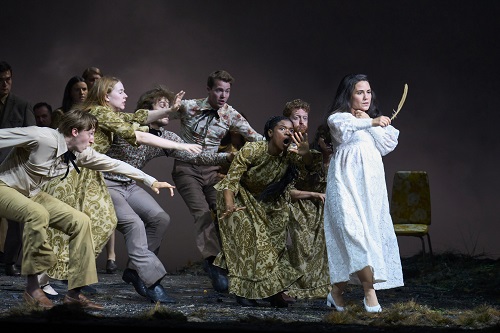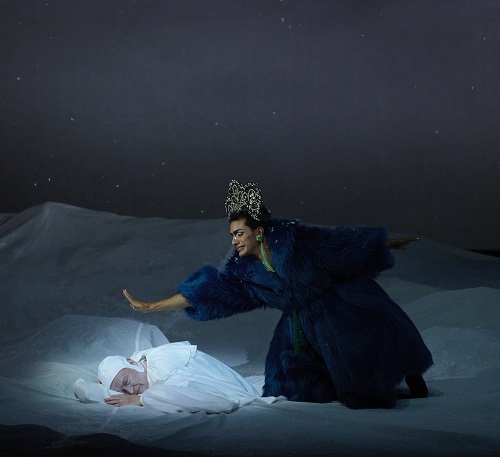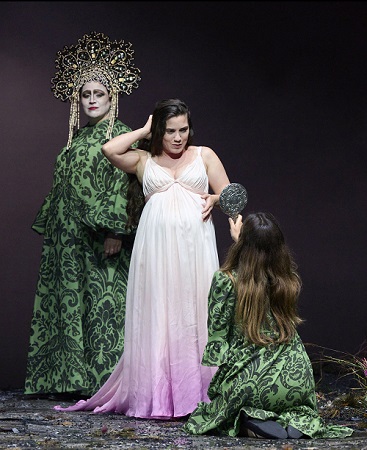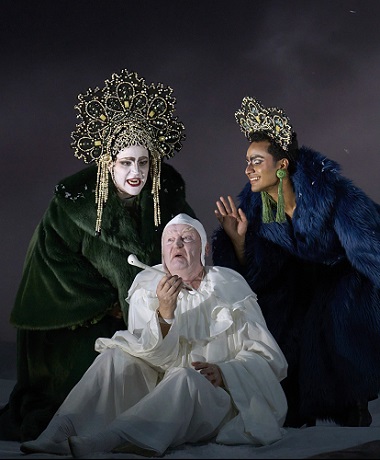“No Oratorio, but a baudy [sic] opera.” Such was the assessment of Handel’s Semele offered by Charles Jennens, the librettist of Handel’s Messiah. He was probably echoing the somewhat cold reception given to the concert performance presented ‘in the Manner of an Oratorio’ at Covent Garden in February 1744 by a middle-class audience who found Handel’s Semele far too openly erotic to be appropriate for a performance in Lent – and the disapproval of those who liked their opera in Italian, not the native tongue.
The literary origins of the text that William Congreve devised for John Eccles, which the latter never set, lie – like those of so many operas – in Ovid’s Metamorphoses. Essentially, dalliances and disputes between mortals and the gods don’t end well. Semele, the daughter of King Cadmus of Thebes and of the Queen Harmonia, rejects her proposed husband, Athamas, in favour of the god Jove, whose child she is carrying, and escapes earthly realms for an Arcadian paradise. Jove’s wife, Juno, secures her revenge by nurturing the narcissistic Semele’s ambitions for immortality and encouraging her to ask the god to appear before her, not in human form, but in all his godly glory. The resulting thunderbolt triggers a tragic conflagration, and Juno smugly celebrates her triumph.
The epic and supernatural elements of this ‘English opera’ (surely this is what Semele is, Handel’s required modifications to the libretto facilitating a theatricality that emanates from every bar of music?) offer opportunities for spectacular dramatic effects – but if Handel’s 1744 audience had been denied the latter, then so (excepting the aforementioned inferno) are those attending Adele Thomas’s new production at Glyndebourne. No grand temples, celestial palaces, or Congreve’s ‘pleasant country’ here: rather an industrial wasteland – grey, grubby, grim.

Thomas seems to have been inspired by her own experiences growing up in Port Talbot. As she puts it in an interview in the programme book, South Wales was “a place I felt suffocated, like I could never fully let my limbs or my mind extend” unable to escape “the never-ending slate grey sky” (I hesitate to say it, but many an adolescent has so lamented).
So, this Semele is not an over-ambitious, selfish seeker of social advancement – though Congreve’s late Restoration text surely had several specific targets in its sights? – but a soulful dreamer whose integrity is betrayed by both earthly and supernatural bullies. Or, as Alexandra Coghlan puts it in her cogent interview piece with Thomas, it’s not so much what Semele is running towards that is important to Thomas, but what she’s running from. The Glyndebourne Chorus, superb of voice, as always, are vicious in their stabbing gestures of coercion and control. Too often in this production, though, they are essentially static (choreography, Emma Wood), a massed mob (swapping grey for black from Act 2).
It’s all terribly earnest. Designer Annemarie Woods’s thunderbolts serve only to illuminate the desert. Where is the playfulness, the ribaldry, that the music expresses at every twist and turn? The buoyancy which makes the tragic denouement all the more powerful for the contrast it offers to the prevailing irony? In the opening scene, why are modern-day Thebans worshipping pagan Roman gods? The wedding scene is almost aggressively aborted: Semele, dressed in a white frock which presents a ‘virginal’ contrast to the Chorus’s miserable beige and khaki – and why does no one notice that she is obviously pregnant with Jupiter’s child? – is presented as a sort of modern-day ‘sacrifice’. No wonder she’s desperate to flee for more fertile ground.

But, though she is installed in Mount Cithaeron by her immortal lover, it’s no paradise: the stubbly grass is just a bit longer (watching Jove warily wade his way out of the scrubland after he’s tried to distract his lover from her thoughts of immortality is quite painful). As so often in this production, one struggles to ally the visual scene before one with Congreve’s text: for example, Iris describes Semele’s bedchamber as a place of libidinous luxuriousness: “There, from mortal cares retiring,/ She resides in sweet retreat./ On her pleasure, Jove requiring,/ All the Loves and Graces wait.”
And, by Act 3 – after two one-hour intervals either side of Act 2 (certainly not necessitated by scene changes) – we’re in a snow-strewn Antarctic wilderness, watching Juno and Iris dupe Somnus into diverting the dragon sentinels that protect Jove’s palace. Yes, Semele does move between mortal and immortal realms, but Thomas’s switches between realism and abstraction don’t really convince.
If Thomas and Woods promote a vision of apocalyptic anxiety, then on the whole the vocal performances do lift one up from the abysmal, if not quite to Handelian apotheosis. In the title role, the American soprano Joélle Harvey works hard to achieve the balance of sensuousness and seriousness that Thomas requires. Her soprano is fairly light, but sweet, clean and beguiling. ‘O sleep, why dost thou leave me’ is appropriate languid – yes, she’s restless, but Harvey and conductor Václav Luks appreciate that the aria expresses her longing not her dissatisfaction. In ‘Endless pleasure, endless love’, her soprano is smooth, unfussy and fluid – and we’re convinced by her expatiation on the sexual satisfaction offered by her godly lover. Harvey really shines in Act 3, her series of arias capturing the complexity of Semele’s situation and struggle. Initially eschewing the mirror proffered in ‘Myself I shall adore’, Semele’s submission to self-regard confirms the forces of oppression and manipulation against which she futilely battles. And, Harvey is brilliantly, maddeningly insistent in ‘I ever am granting, you always complain; I always am wanting yet never obtain’: many a marital tiff evoked here – no wonder Jove acquiesces, for a quiet life.
Stuart Jackson’s Jove, dressed in a luminous lime-green suit, arrives on the set like a walking – or, rather, a reclining – highlighter pen (costume design, Hannah Clark). I’m not sure that he looks exalted or very god-like, but Jackson’s lovely lyric tenor and easeful coloratura are charming. Perhaps Jove needs to be more forcefully characterised, but Jackson does convey a surprisingly genuine devotion in ‘Where’er you walk’ – he essentially lets the music speak for itself, a sensible though sometimes underwhelming strategy (and why is the tempo so turgid?) – and a real sense of anguish when asked by Semele to appear before her in his divine form. The tenor’s accompanied recitative, expressing his heartache, in Act 3 is superb.

It’s really not clear to me why Juno and Iris seem to have wandered in from a production of Turandot, but Jennifer Johnston – despite the apparent absence of any directorial input – conveys Juno’s vehement desire for vengeance with commanding focus, delivering the heated recitative with which she stirs the drowsy Somnus (‘Awake, Saturnia, from thy lethargy’) with delicious dastardliness. Often, the roles of Juno and Ino are taken by the same singer – facilitating some neat comedy in Act 3 when Juno disguises herself as Semele’s sister – but here Stephanie Wake-Edwards takes the latter role, her rich mezzo, sufficiently rounded and firm in the lower register, enabling her to create a strong portrait of awed obeisance in the face of divinity.
But, why Ino would love this Athamas is anyone’s guess: countertenor Aryeh Nussbaum Cohen’s unwanted fiancé is thin-skinned and arrogant – he needs his ‘friends’ to shore up his ego. The selfish sentiments of Act 1’s ‘Hymen, Haste’ were dexterously conveyed, but occasionally, in pushing the projection, the intonation slipped a little. ‘Despair No More’ in Act 3 skipped with similar deftness but was decidedly unsettling from a dramatic perspective. I guess that’s what Thomas intended.

Bass Clive Bayley skilfully doubled up as a nastily chivvying Cadmus and a grave Somnus – perhaps the comedy of the latter role might have been channelled a little more? – bringing rich sonorities to both roles and sounding appropriately lethargic in Handel’s graciously leisurely ‘Leave me, loathsome light’. Male soprano Samuel Mariño was sweet-toned as Iris, but a bit wan.
In the pit, musical values were high and Luks’ direction was meticulous. On the whole, he allowed the singers sufficient space to convey the characters’ inner thoughts and connect with the audience.
At the close, Semele is enclosed in a massive wicker effigy of Juno and immolated. It’s impressive ‘theatre’ but a miserable conclusion to the dreams and spirit that Thomas has professed to discern and communicate. What are we to make of the Chorus’s grim writhing, more deranged than orgiastic? Are we supposed to be celebrating the birth of Bacchus? It’s more horrid than honorific. Perhaps, to return to Thomas’s ‘concept’, Semele is destroyed not by divine desire – the sexual power of Jove’s thunderbolt is not exploited in this production – but by the deadly concoction of provincialism, puritanism and prurience?
Stanley Sadie suggested in his Grove article that ‘the final celebration of love and music, stands as one of the great musical paeans to the joys of humankind’. What is missing from this production is any sense of the joy of human love.
Claire Seymour
Semele – Joélle Harvey, Jove – Stuart Jackson, Juno – Jennifer Johnston, Cadmus/Somnus – Clive Bayley, Athamas – Aryeh Nussbaum Cohen, Ino – Stephanie Wake-Edwards, Iris – Samuel Mariño, Dancers – Robin Gladwin, Harriet Waghorn, Jonathan Mewett, Jack Richardson; Director – Adele Thomas, Set Designer – Annemarie Woods, Costume Designer – Hannah Clark, Choreographer – Emma Woods, Lighting Design – Peter Mumford with Rick Fisher, Orchestra of the Age of Enlightenment, The Glyndebourne Chorus (Chorus Director, Aidan Oliver)
Glyndebourne, Sussex; Friday 28th July 2023.
ABOVE: Joélle Harvey and Stuart Jackson © Glyndebourne Productions Ltd, Photo: Richard Hubert Smith